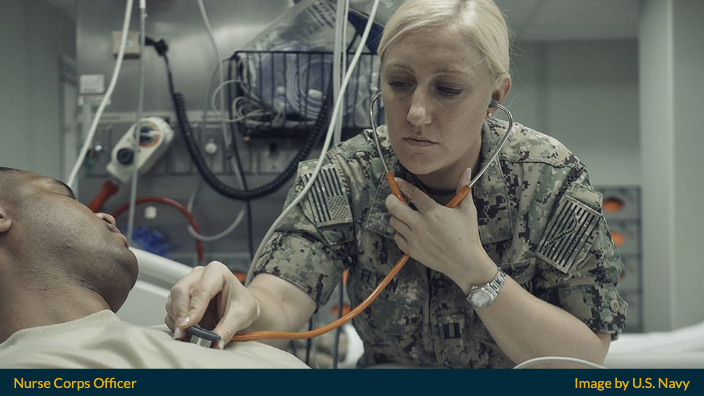Last Updated on November 16, 2023
This guide provides helpful information for those who are looking to become a Certified Registered Nurse Anesthetist (CRNA) in the Navy during Fiscal Year 2024.
Specifically, we shall discuss the Navy scholarship program for civilian and military nurses to become a CRNA through the Uniformed Services University of the Health Sciences graduate program.
There are many aspects and requirements involved in this process, but this robust financial assistance is worth investigating.
So, let us jump right in.
What Does a Navy CRNA Do in the Navy?
A Navy CRNA (Certified Registered Nurse Anesthetist) is a Nurse Corps Officer in the Navy who administers and supplies anesthesia-related care to military and civilian patients before, during, and after surgery.

Navy CRNAs collaborate with a variety of medical practitioners, including surgeons, dentists, physician assistants, nurse practitioners, and podiatrists
They serve as a liaison between the patient and their primary care provider.
CRNAs are critical to providing a complete understanding of how a surgical procedure should be approached to ensure maximum safety and comfort for each patient because of their constant communication with both patient and medical providers.
How to Become a Navy CRNA?
Becoming a Navy CRNA involves two distinct layers of competition and selection.
First, applicants must have been accepted to the Registered Nurse Anesthesia Doctoral Education Program at the Uniformed Services University of the Health Sciences (USU).
Second, applicants must compete for selection to become a commissioned officer in the Navy.
Below are the detailed requirements.
Admission Requirements for the Registered Nurse Anesthesia Doctoral Education Program
Applicants must be a commissioned officer or service-sponsored civilian in the United States Army, Air Force, Navy, or Public Health Service with a Bachelor’s (or master’s degree with a Nursing focus) from an authorized institution.
Academic Prerequisites:
- The USU application requires evidence-based writing
- Current curriculum vitae
- Current service-specific officer brief (e.g., SURF, OSR, ORB)
- Competitive GRE Scores
- Transcripts from all colleges and institutions attended, demonstrating:
- Undergraduate GPA of 3.0 or higher on a 4.0 scale
- Combined science GPA of 3.0 or higher on a 4.0 scale (chemistry, biochemistry, anatomy, physiology, etc.)
- Grade of 3.0 on a 4.0 scale or better in a non-nursing biochemistry, physiology, or pathophysiology course from an accredited university within the previous 5 years. Graduate level courses are recommended, but undergraduate courses will be accepted.
- Grade of 3.0 on a 4.0 scale or above in a statistics course from an authorized institution. Although graduate level courses are desirable, undergraduate level courses will be accepted.
- Active, unrestricted nursing license.
- Applicants must have at least one year of experience as a registered nurse in a critical care environment at a military or civilian hospital. Experience in a critical care area inside the United States, its territories, or a US military hospital outside of the United States is required. The registered professional nurse should have gained critical decision-making and psychomotor skills, proficiency in patient assessment, and the capacity to use and understand advanced monitoring methods throughout this experience. A critical care environment is one in which the licensed professional nurse controls one or more of the following regularly: invasive hemodynamic monitoring (such as pulmonary artery catheter, CVP, arterial); cardiac assist devices; mechanical breathing; and vasoactive infusions. Surgical intensive care, pediatric intensive care, and neonatal intensive care are some examples of critical care fields. Those with prior expertise in other fields may be considered if they can show competency in the management of unstable patients, invasive monitoring, ventilators, and critical care pharmacology. For example, a military nurse who worked in an ICU in a military hospital for 6 months before being sent to Kandahar and working on critical care or trauma for 7 months may have the required one-year experience to apply for the program.
- Shadow a CRNA for at least 20 hours. If you need help, contact your chief nurse/senior nurse executive.
- Applicants may be asked to take part in a faculty interview.
- Advanced Cardiac Life Support—current and active (ACLS)
- Basic Life Support—current and active (BLS)
- Pediatric Advanced Life Support—current and active (PALS)
- Three letters of reference with unconditional admissions recommendations for the applicant from:
- Senior nurse executive/chief nurse (or another officer in direct chain of command)
- APRN in the specialty for which you are applying
- Direct supervisor
What to Expect
There are no tuition or fees to pay. Students are required to do obligatory service under the standards of their sponsoring organization.
Students will stay on the USU campus for the first 15 months of the program (Phase 1), gaining the academic and professional education required for entry into the clinical arena.
Students will undergo a Permanent Change of Station (PCS) to a military medical treatment center (Phase II clinical site) during the second year, where they will finish their final 21 months of training. During Phase II, enrichment site rotations with probable TAD/TDY durations give additional clinical experiences. The Phase II location will be chosen during the first several weeks of Phase I training.
Follow this link to apply for the Graduate School of Nursing at the USU.
Requirements for Commissioning Through the Navy CRNA Program
| Citizenship | Applicants must be citizens of the United States. |
| Age | Applicants must be commissioned in the Navy before reaching the age of 42. Waivers will be handled on an individual basis. |
| Education | A baccalaureate or advanced nursing degree from a nursing school certified by the Accreditation Commission for Education in Nursing or the Commission on Collegiate Nursing Education. |
| Physical | Under NAVMED P-117 (MANMED), Chapter 15, and as specified in DoD Instruction 6130.03 (Medical Standards for Appointment, Enlistment, or Induction into the Military Services). |
| Clinical Experience | Applicants must be approved by the Centralized Credentials and Privileging Directorate for the Critical Care (1960) or Neonatal Intensive Care Nurse (1964) Subspecialty Codes or satisfy the requirements for the 69K (Pediatric Intensive Care Nursing) Additional Qualification Designation. |
| License | Applicants must have a current, unrestricted license to practice as a registered nurse granted by a state, territory, or commonwealth of the United States or the District of Columbia and must have passed the National Council Licensure Examination (NCLEX-RN). |
| Certification | Current certification as a Critical Care Registered Nurse from the American Association of Critical Care Nurses. |
All applicants must have applied and been admitted to the USUHS Registered Nurse Anesthesia Doctoral Education Program. USUHS admission processes may be found at https://www.usuhs.edu.
Select “Admissions,” followed by “Graduate School of Nursing Admissions.” To apply, go to the website and download an online application.
The application, together with all relevant documentation, must be submitted by the 15th of August of the year before attendance. Transcripts and reference letters from universities should be sent to the applicant and not directly to the USUHS Graduate Education Office.
Waivers
If the candidate is beyond the age restriction for commissioning but has an extraordinary record or showed skill set necessary by the Navy, a waiver may be granted in restricted numbers.
When reviewing an age waiver request, specialties that are understaffed and have a history of unmet recruiting objectives will be prioritized.
Age exemptions for candidates aged 42 to 47 shall be reviewed and processed under OPNAVINST 1120.7A.
Who Can Apply to this Program?
The following may apply to the Navy CRNA program:
a. Fully qualified civilians
b. Enlisted members from any branch of the armed services (Active or Reserve) if a suitable conditional release is granted and all program conditions are satisfied. Prior Navy enlisted members must provide a copy of their enlisted performance summary record, as well as three years of performance evaluations.
c. Commissioned personnel of any branch of the armed forces (Active or Reserve) who are not otherwise eligible for inter-service transfer or superseding appointment, provided the member’s service component approves conditional release (other services only) or contingent release (USN/USNR only) and all program requirements are met.
Service Obligation Upon Selection
Minimum Active Service Term of Three Years from Date of Appointment The minimum time is concurrent with any active-duty commitment for military-sponsored education or training.
The remaining military service commitment, up to eight years, may be spent on a reserve component.
The receipt of special pay and bonuses, education obligations, and minimum activity tour requirements from joining the Navy as an active-duty officer may cause the obligation term to be extended.
Selectees must continue to complete all eligibility standards as provided in DoD Instruction 6000.13 while enrolled in the Navy CRNA program at USU.
If a selectee cannot achieve these eligibility standards before or during the full-time CRNA program, it will be deemed disqualifying, and the selectee may be withdrawn from the program at the discretion of the Director, Navy Nurse Corps.
Selectees also commit to serve on Active Duty for three years for the first year of study and six months for each successive six months of study or part thereof.
Selectees who do not finish the program of study will serve as critical care nurses in the adult, neonatal, or pediatric settings. The commitment will be in line with DoD Instruction 6000.13, with a three-year minimum requirement associated with this training.
More Information
If you want more information about becoming a Navy CRNA, the next logical step is to contact a Naval Officer Recruiter.
Let us figure out how you can benefit from becoming a Navy CRNA—or if it is even the right career move for you.
If you are still a nursing college student, you might be interested in the Navy Nurse Candidate Program.
Hope you find this useful in your career planning.


